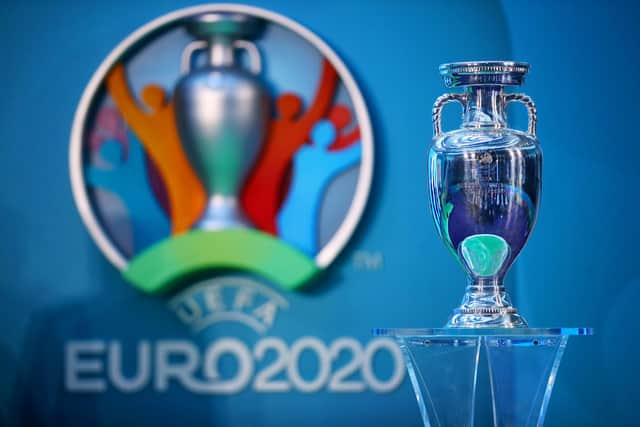How many teams are in the Euros? What teams are left in Euro 2020 – and football tournament format explained
and live on Freeview channel 276
Euro 2020 is here.
The delayed European Championships has provided a festival of football since it began in June 2021 after being pushed back a year due to the Covid pandemic.
This summer's tournament has been held in various cities across the continent to help mark and celebrate the 60th anniversary since the first Euros.
Advertisement
Hide AdAdvertisement
Hide Ad

Over that time the championships have witnessed many memorable moments - like Paul Gascoigne's 'dentist chair' celebration against Scotland in 1996.
It has also taken on different formats with the number of national teams competing at the finals increasing from eight to 16 at the same Euro 96 tournament.
Now, with the postponed Euro 2020 in full swing, we take a look at how many nations competed this time around and what Euro 2024 may look like...
How many teams are in the Euros?
A total of 24 nations started in the group stage at Euro 2020.
Advertisement
Hide AdAdvertisement
Hide AdThis is the same number of teams that qualified for the Euro 2016 tournament which attracted some criticism from Germany coach Joachim Low and defender Mats Hummels.
Germany were beaten by France in the semi finals but both Low and Hummels said the quality of the tournament wasn't up to its normal standards due to the increased number of teams.
Speaking to German broadcast company ZDF, Low said: "I think 24 teams are too many. The World Cup's going to be increased to 40 teams and it's getting more and more, and that's a problem in the long term.
"Sometimes you get the feeling it's not doing football any good. The quality is suffering."
Advertisement
Hide AdAdvertisement
Hide AdHummels said: "The level at this European Championship was not what we had hoped for. There were many teams who didn't want to do anything with the ball and just packed men behind the ball."
What is the Euro 2020 format?
Despite this vocal attack on the expanded European Championships in France 2016, UEFA has stayed with 24 teams for Euro 2020 tournament.
Six groups (A-F) of four teams competed in three group stage matches before knockout football decided the two teams to compete in the final.
The top two teams in each group qualified for the knockout stage along with the four best third placed finishers, meaning eight teams went home after the groups.
Advertisement
Hide AdAdvertisement
Hide AdA Round of 16 determined who made it through to the quarter finals, with the winners reaching the semi finals and the winners of the last four games will play the final.
Who are the teams competing at Euro 2020?
| Group A: Italy, Switzerland, Turkey, Wales Group B: Belgium, Russia, Denmark, Finland Group C: Ukraine, Netherlands, Austria, North Macedonia Group D: England, Croatia, Czech Republic, Scotland Group E: Spain, Poland, Sweden, Slovakia Group F: Germany, France, Portugal, Hungary |
What teams are left in Euro 2020?
Following Italy’s semi final penalty shootout win over Spain, Roberto Mancini’s men extended their unbeaten run to 33 games and booked a place in the final of Euro 2020.
There they will face the winner of the other semi final – either England or Denmark – which is scheduled to kick off at 8pm (BST) on Wednesday 7 July 2021.
Advertisement
Hide AdAdvertisement
Hide AdWhat will the Euro 2024 format be?
The expanded tournament has faced some criticism but is part of UEFA's vision for the future of the European Championships, which could see 32 teams compete at some stage.
UEFA officials keep the format under review, with the general secretary Theodore Theodoridis saying: "I am confident that we have more than 32 very competitive teams in Europe."
And added: "But a format of 32 would kill the qualifiers so it is balance, you have to consider a little bit of everything."
The next Euros, in Germany in 2024, will see 24 nations again compete with the same format of top two and four best third placed finishers advancing from the group stage.
Comment Guidelines
National World encourages reader discussion on our stories. User feedback, insights and back-and-forth exchanges add a rich layer of context to reporting. Please review our Community Guidelines before commenting.
